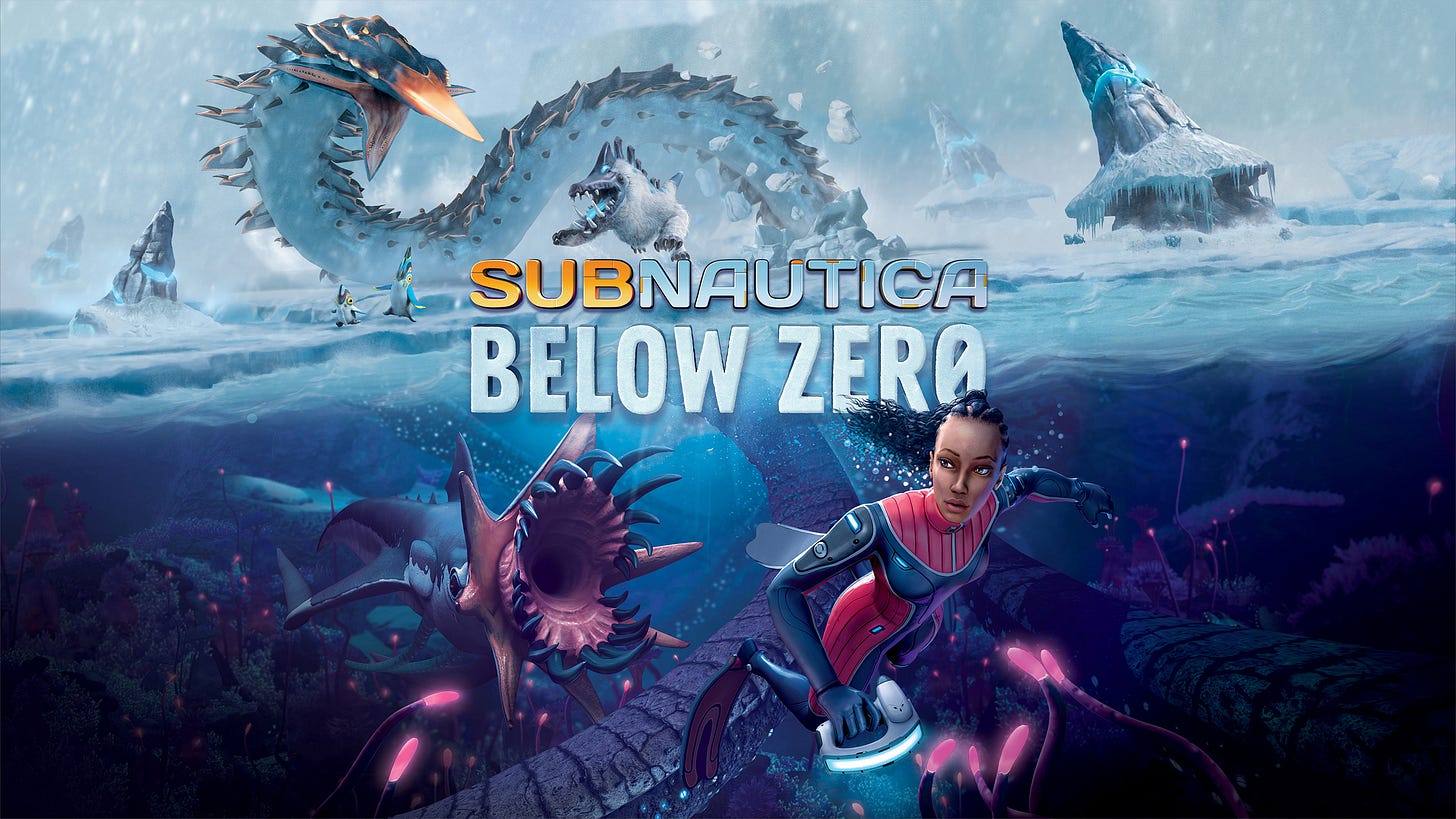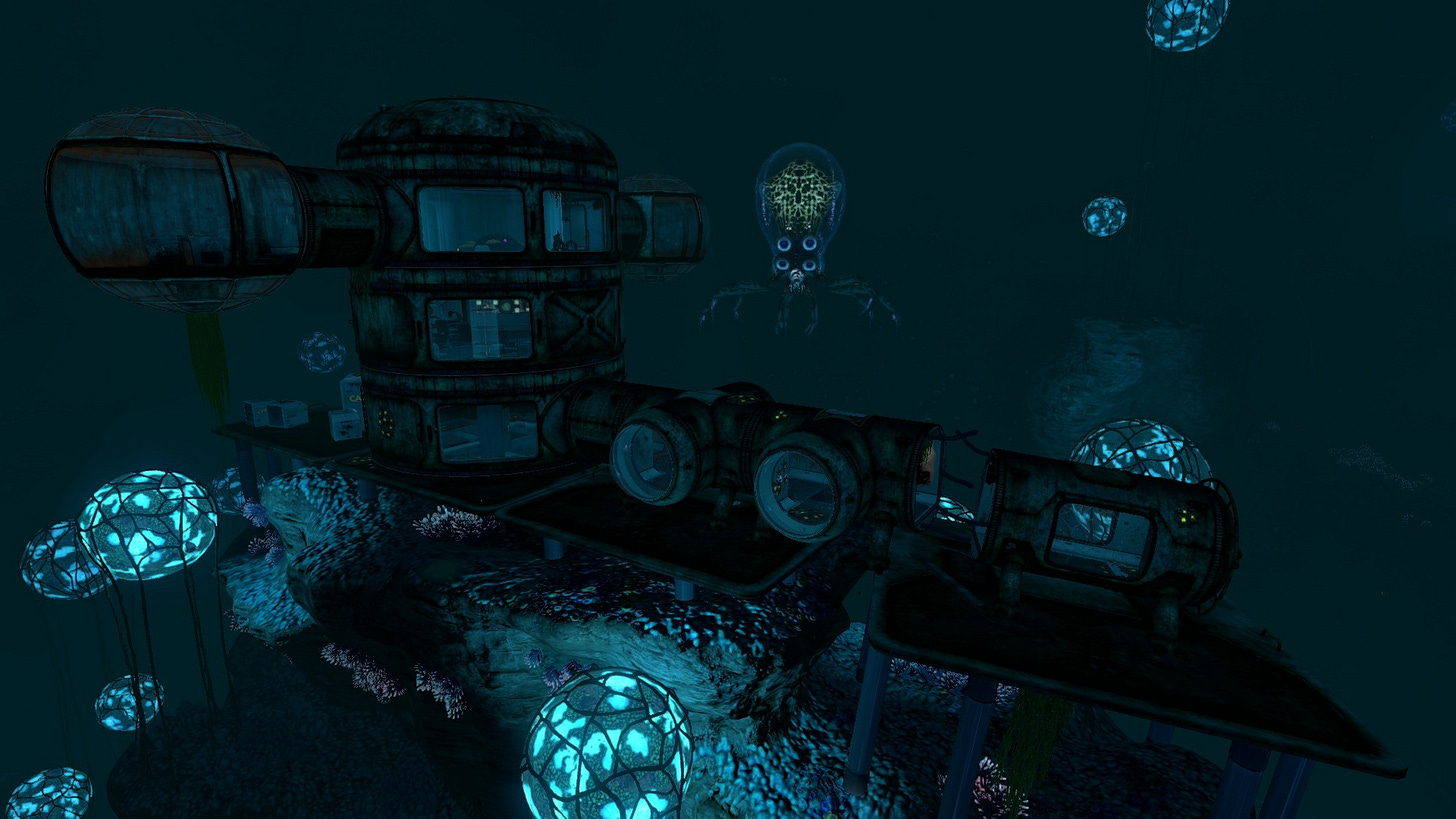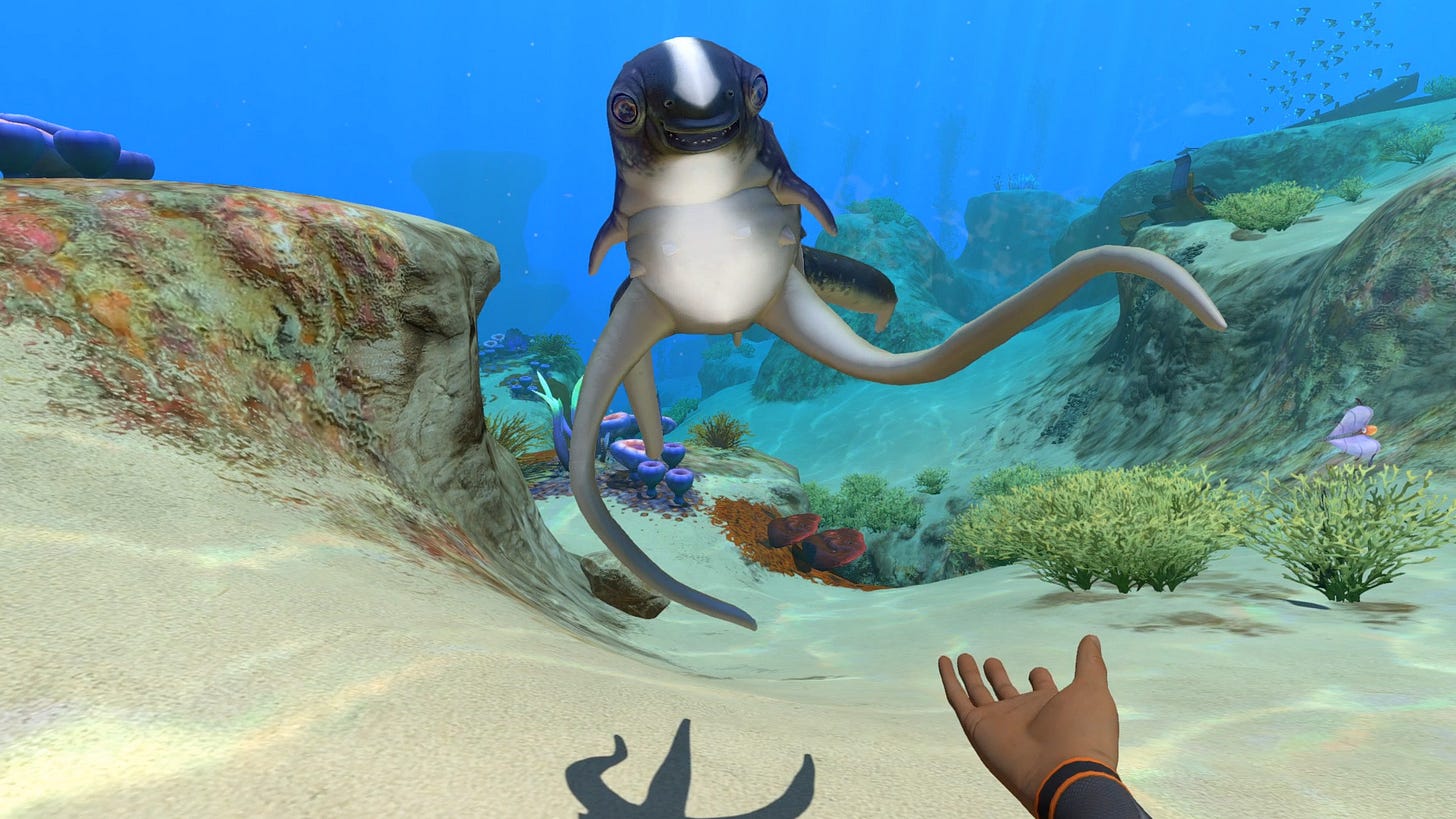Subnautica: Below Zero (Or How Video Games Squander Their Unique-ness)
A rambling nightmare essay that's only sort of a review of this game.
This is an unusual one, because I didn't finish this recently. I played this game *ages* ago. I did stream it though! So it still goes here, damn it.
Subnautica: Below Zero! It's the sequel (or possibly standalone expansion? I have no idea what that term means, and I refuse to believe anyone else does, either) to Subnautica.
It's two years after the events of the first game. You never hear anything about your previous character though, so you don’t need to care about that. You play as a rogue scientist called Robin Ayou. Your sister went missing/is dead on the same planet from the first game. (They get to reuse a lot of the assets that way.) You land in a pod amongst some weird-looking penguins. Go nuts!
On the surface it's a very similar game. The "big" change is that it swaps the landscape from tropical to snowy. They call it "Sector Zero." Get it? Below Zero? No, seriously, do you get it? Because you go underwater and into caves.
Everything else is broadly the same. You build a knife, you cut open some rocks, avoid spooky fish, eventually zip around in an underwater truck like you're a Clam Shipping Magnate. It's everything you could want or expect from a sequel to Subnautica, at least in terms of gameplay. It's pretty fun!
The other, less talked about, and more interesting change is the way it tells its story. I think it's a good case study of what games do well, and what they do badly while trying to emulate other mediums.
Subnautica (the First) is one of my favourite games of all time. I don't think it's necessarily the best written game of all time, it doesn't look that incredible, and it's often a glitchy mess. It's not for everyone.
The main reason I think it's so great is because of the way it tells its story. The way it develops its world and interacts with the player. It's like the platonic ideal of a video game. If there was a Library of Congress or Criterion Collection equivalent for video games, something to recognise "cultural or artistic signifigance," It'd be one of the first (and only..) things I'd submit for consideration.
When you first get dropped into Subnautica, the sole survivor of a spaceship crash on a vast, ocean planet, it could easily be mistaken for another generic survival game. Minecraft or Rust but underwater this time. It's only when you start to explore that the game opens up into something more interesting.
As you putter around in your little fins, weaving through murky kelp forests or jagged caves, you'll ocassionally find signs that you aren't the first one here. There's discarded PDAs, old audio recordings and text documents from years ago, remnants of shelters, ships. Structures that don't look human.
These hints and nuggets of information (as well as the inciting element of the plot) lead you further and further out of the safety of the shallows, deeper and deeper into the water, until you find strange new areas with more clues about the world that fill in the gaps in your earlier theories. By the time you reach the end, you've put together a fully realised world and backstory without anyone telling you all that much directly.
Player agency and gently urged exploration is the way you get exposition. The guidance is light enough that it doesn't feel like you're being railroaded, and you're left to piece things together on your own, at whatever pace and in whatever order you like. It's rewarding, it makes you feel like you're piecing together an important puzzle, even if it's just the game cleverly feeding you things. It's a way of telling a story and building a world that works very well. It's also one that I think is unique to video games.
Below Zero doesn't do this. It takes a more ...traditional? approach. From the very beginning, your character spells out their backstory and ambitions. They have a clear cut mission and broadly know how to accomplish it. Voiced characters talk to you and send you to specific places through cutscenes. Lore and exposition is delivered through awkward, static conversations. There's virtually none of that player agency that made the first one so special. You still explore, yes, but it's not for information or narrative, it's for materials or because you were sent there.
One of the most fundamental, intrinsic aspects of a video game is User Input. Without the player interacting, nothing happens. If you click "Start" and then don't pick up a controller or click on a mouse to initiate things, the game will stall, locked in place like a cursed painting. This is an obvious difference from other forms of media. If you look away from the screen during a movie the actors don't all stop and awkwardly wait around with their hands in their pockets until you join back in. The player is responsible for the game continuing. They make choices just as much as the developer.
In my opinion, (which is almost worthless) a huge flaw in gaming is that *most of them* don't utilise this aspect of the medium. There are several exceptions, and it can vary a lot by genre, but modern games, especially large budget, AAA games, are *desperate* to be movies. They *ache* to be taken seriously in the same way as movies or prestige TV shows. They appear to have a chip on their shoulder about how games are seen by the world. The inevitable result is that games have become more and more like movies.
Now you may ask, why is that a big deal? I mean, other than losing out on that interesting aspect I mentioned above. As long as the thing is good, who cares how it's done? Well, the problem with games trying to be movies is that they usually *suck* at it.

For a long, long time, video games were written by socially inept, nerdy, straight, cis, white guys who got bullied in high school in the 70s and 80s. They couldn't write a realistic, interesting character to save their lives, and every plot was some combination of "Save the Kingdom!" and "You have a sweet sword/gun and you're kind of an outsider, but everyone likes you except the bad guys. Also every woman is in a metal bikini." Those guys are still largely in charge, and they've given rise to another generation of nerds who grew up playing those games. (There's a reason that gaming has a reputation as a toxic space.)
Games writing is typically very bad. It's just something that you take for granted. Even recent, high budget games that get praised by the gaming press for being well-written are, at best, at the level of low to mid-tier Hollywood blockbusters. The sort of thing you get reminded of 15 years later and think, "Oh yeah, I *think* I saw that, it was alright." The sort of thing Harrison Ford would have starred in in the 90s, or that Dwayne Johnson stars in currently.

Let's use The Last of Us and God of War as examples. These are recent, beloved games that the games media lauded as modern masterpieces. It feels glaringly obvious to me that these games were written with the hopes of eventual HBO adaptations. They're basically 3 hour movies painfully stretched out to 12 hours by adding zombie shooting or repetitive battles with giants. They almost seem resentful of the fact that they're video games. If you spend longer than 30 seconds mulling over a puzzle in GoW, the game will just have a character tell you what to do so it can get back to its cutscenes.
These games, and most games in my opinion, aren’t interested in being *games.* They want to be something else. They use the tropes and styles of other media. They don’t take full advantage of what they can do to the player with the tools they have. People make fun of Telltale and their “choices matter” schtick, but at least the kernel of an interesting idea is there, regardless of the execution.
Gamers are so starved for good writing (and let's be honest, severely lacking in media literacy) that anything even a little nuanced, like a gruff, bearded man saying, "I may have muscles, yet sometimes I feel sad." feels like an emotional gut-punch.
Not every game has to aspire to the levels of classic literature, it just feels like games get away with a lot more narrative shortcuts and lazy tropes than other media. The critical darlings rarely approach the same level of quality. I can think of a hundred movies or books that made me change the way I viewed the world, even in a tiny way, or at least think about an aspect of life in a way I hadn’t before. When I think about games that have done the same, I can probably count them on one hand.
The other side of the coin is indie games recycling the same clumsy metaphors about depression and coming-of-age 400 times in a row. Again desperate to be movies, just the more "sensitive" kind. Shooting for Charlie Kaufman, landing on Zach Braff. A fate worse than death.
All this ranting and rambling serves to say that Below Zero, while being a genuinely enjoyable time that I would recommend for fans of the original, falls into the exact same pitfalls as most video games.
It plays out like a standard video game story. It's deliberately paced and blocked out, there's set pieces and narrative acts. It all works fine. The story is passable, there's some fun characters, but you're never going to play this and get a genuine emotional impact from it. You’re not going to feel the way you felt with the first one.
It's generic, and there's nothing about it that *needs* to be a video game. It could have been a comic, or a show, or a radio drama, anything. Normally that wouldn't be a huge mark against a game, like I said, we all take this sort of thing as granted. It's just more glaring when compared to what came before.
I don't even blame it either! I think it would have been virtually impossible to capture the same Subnautica feeling in a sequel. People already know what to expect. I think the *real* mistake wasn't the narrative shift, but the decision to make a follow-up at all. It's a symptom of another problem I have with media, the inability to let anything end, to let things die, to let something exist as a standalone piece of art. I'm not going into that here though, I've already talked for far too long, and I can feel the fedora growing out of my scalp, like a disgusting parasite begging me to say something fucked about marginalised groups.
In short. Subnautica is like the JAWS of video games. The first one is a groundbreaking, unexpected hit that did something interesting and inspired others to emulate it. It'll be remembered and cited as an influence for years to come.
Jaws 2 is a movie.
-
Rating: Birdseye Fish Fingers out of Salmon Fillet.







